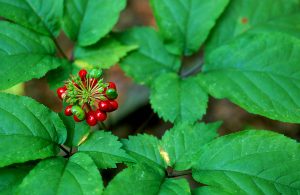AV's Intern Team | June 15, 2015 | 1 Comment

American ginseng, Panax cinquefolium, is native to the eastern and midwestern United States. Photo by Eric Burkhart
By Eliza Laubach
A coveted medicinal plant of the Appalachian mountains, wild American ginseng populations are at risk. Two states have listed the plant as endangered, while eight others also place legal limits to protect the plant.
Sometimes called Grandfather Ginseng, most of the herbs’ roots harvested in Appalachia are shipped to China, according to the U.S. Fish and Wildlife Service. In Asia, the native ginseng is famed, farmed and over-harvested as well, for its reputed benefit to the immune and nervous systems and improved mental and physical strength.
To discourage ginseng poachers and maintain a healthy wild population of American ginseng, Pennsylvania Certified Organic, a national organic certifying company, has teamed up with United Plant Savers, a nonprofit dedicated to protecting at-risk and endangered medicinal plants. Together they have created a set of guidelines for sustainable cultivation and harvest of forest-grown native plants. They started with American ginseng and established a fund to help the first eight farmers through the application process.
Participants will bear a Forest-grown seal on their ginseng products, giving consumers the option of purchasing sustainably farmed ginseng. Adam Seitz, certification specialist at PCO, said the program intends to involve farmers and those who process ginseng into medicine. Six producers and processors have applied this spring.
PCO is developing sustainable cultivation guidelines for other at-risk plants native to Appalachia, such as black cohosh, goldenseal and ramps. Seitz intends to expand the forest-grown certification program to include these and other medicinal plants from across the country.
To learn more, visit paorganic.org
Like this content? Subscribe to The Voice email digests
i am very interested in these programs and would like more information. I own 400 acres in NE PA and am working to utilize my woodlands better.